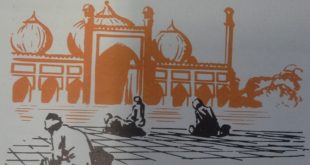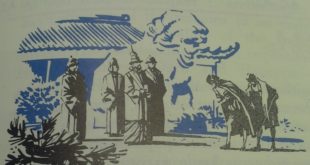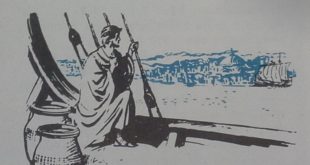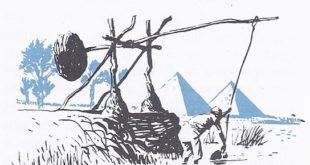Thirteen and a half centuries ago a new religion began in Arabia. Today millions of people are followers of this religion. It is called Islam and its followers, Moslems. All their lives long, Moslems must pray, in ways clearly prescribed, five times every day. No ordinary event must be allowed to interfere with these moments of prayer. Moslems must learn to recite their creed — a long statement of their religious belief. For one month each year they must fast all of every day from sunrise to sunset. They must give generously to charity. They should, if at all possible, …
Read More »The Growth of Civilization in Early China
In the same way that important ancient civilizations grew out of small beginnings in the valleys of the Nile, the Tigris-Euphrates and the Indus, so another great civilization of Early times — that of China — was cradled in the valley of the Yellow River. To be sure, China’s civilization did not commence as early as did Egypt’s, Mesopotamia’s, or India’s. The ancient Egyptian and the Mesopotamian kingdoms lost their power many centuries ago and early India never became completely united under one empire. China therefore has had a longer national life than any other ancient or modern state. It …
Read More »The Growth of Civilization in Early India
Two hundred years before Columbus discovered America, a certain Marco Polo told strange, exciting stories to his friends and neighbours in Venice, a city in northern Italy. He had travelled, he said, to distant lands in Asia and had become rich. Europeans at that time had some general knowledge of eastern Asia and of its products, but Polo furnished detailed and colourful descriptions of magnificent cities, of strange customs and of powerful rulers who owned many palaces and lived in unheard of luxury. Marco Polo had visited the court of the khan, or ruler, of an empire that included most …
Read More »Christianity Spread in a Divided Empire
Christianity was the movement that spread Across the Roman Empire Pointing the way for the rest of the ancient world toward belief in a single God. The year is 400 A.D. Andropolos paces impatiently up and down the deck of the merchant ship. He is eager to get back home; and to Andropolos, home is the city of Constantinople, a new capital of the Roman Empire. He can already see the walls and buildings of the great city shimmering in the distance. Now the ship is nearing the narrow Bosporus, the waterway where Europe and Asia are hardly a mile …
Read More »The Roman Empire Preserves and Extends Civilization
Today we speak the words, “I am a World citizen,” with pride. To the people of the ancient world the statement, “I am a Roman citizen,” was a badge of high honour. Beginning as a small city state in Italy, Rome grew into a vigorous republic and finally into an empire so mighty that it included the whole of the Mediterranean world. Even after Rome’s grandeur had waned, its influence lived on among later peoples. Rome’s history is a reminder that the destiny of a nation rests more on the wisdom of its leaders and the character of its people …
Read More »The Greeks Lead the Way
If you had been a citizen of the ancient Greek city of Athens on a fine spring morning in 409 B.C., you would have gathered with thousands of your fellow citizens on a hillside inside the city. You would then have listened carefully to the discussion of various matters of business, conducted by the chairman and secretary of the meeting from a platform below and facing you. You would have seen an Athenian citizen thread his way from the hillside to this platform. This was a sure sign that he had a proposal to make to the voters. The citizen …
Read More »Early Civilization Spreads by Land and Sea
Now Hiram, King of Tyre, sent his servants to Solomon, when he heard that they had anointed him King. . . And Solomon sent word to Hiram, “ . . . I purpose to build a house for the name of the Lord my God. . . Now therefore command that cedars of Lebanon be cut for me; and . . . I will pay you for your servants such wages as you set; for you know that there is no one among us who knows how to cut timber like the Sidonians [people of the city of Sidon].” . …
Read More »The Growth of Egyptian and Mesopotamian Civilization
People satisfy their important needs in different ways. For example, most of you obtain water merely by turning on a faucet in your home. The water is pumped from large reservoirs and piped considerable distances before reaching your home. Many however, get water from wells. The water is raised in a variety of ways — by pumps operated by hand, by windmills, by gasoline engines, or by electric motors. In earlier times the well sweep, or pole with a bucket at one end, was often used. If you should travel along Egypt’s Nile River today, you might see a farmer …
Read More »Man’s Long Road Up From Savagery
Perhaps you have asked yourself, “What would I have done?” as you have read an adventure yarn or the true story of some person set down in a wild and remote spot. One of the most famous stories in the English language recounts the adventures of’ Robinson Crusoe, who was shipwrecked and cast ashore on an uninhabited island. Crusoe was completely alone and had only the few materials which he saved from the wreckage. With these and with what he found on the island, Crusoe had to provide his own food and shelter. Days and even weeks were required to …
Read More »Man Faces the Future 1957-1965
On October 4, 1957, the Soviet Union announced to an astonished world that its scientists had launched into orbit an artificial satellite of the earth. The Russians called the satellite “Sputnik,” or little moon. With the invention of the air plane, man had broken the bonds that confined him to the earth; now he could go beyond the ocean of air that surrounded the earth and explore the wonders of space. The way was open for discoveries that promised to surpass those of the age of exploration of the fifteenth and sixteenth centuries. The United States sent up its first …
Read More »








